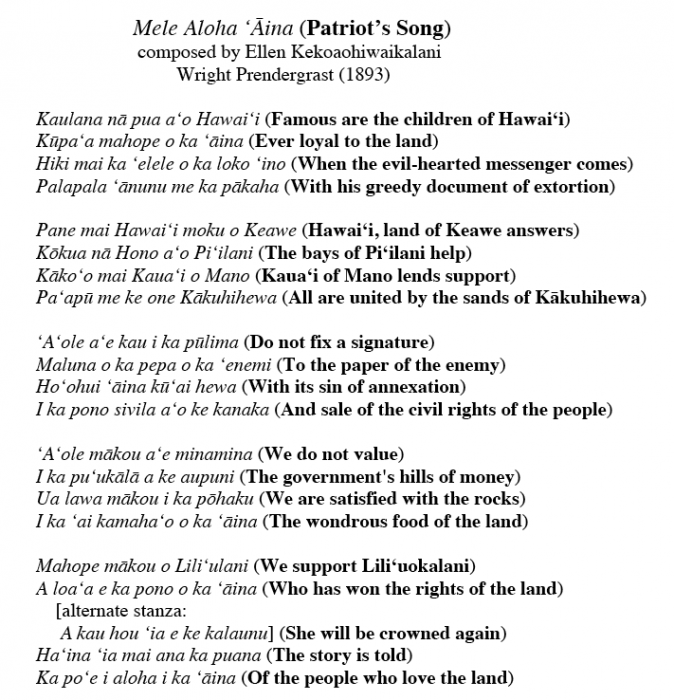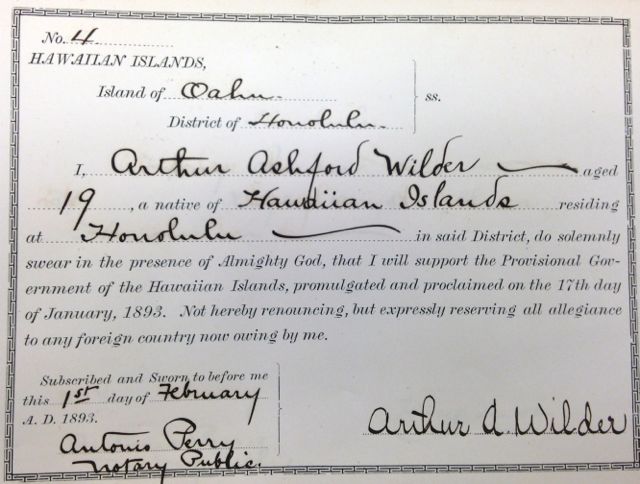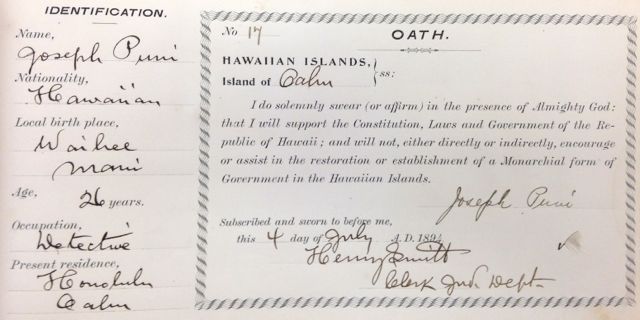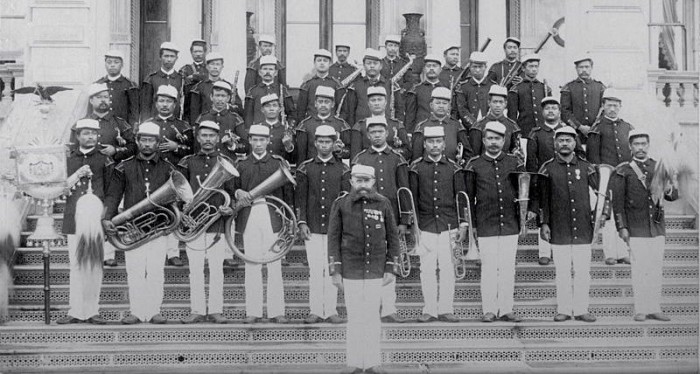After the illegal overthrow of the Hawaiian government on January 17, 1893, the insurgency under the protection of U.S. troops began to force individuals in government to sign oaths of support for the provisional government. If they refused, they would lose their jobs.
This created much anxiety amongst the population and soon pit Hawaiian against Hawaiian. The majority, however, were heeding the call of Queen Lili‘uokalani to onipa‘a (hold fast) peacefully and await the conclusion of the investigation by President Cleveland who sent his Special Commissioner James Blount to the Islands. In a memorial submitted by the officers of the Hawaiian Patriotic League to President Grover Cleveland on December 27, 1893, they aptly explain:
“And while waiting for the result of [the investigation], with full confidence in the American honor, the Queen requested all her loyal subjects to remain absolutely quiet and passive, and to submit with patience to all the insults that have been since heaped upon both the Queen and the people by the usurping Government. The necessity of this attitude of absolute inactivity on the part of the Hawaiian people was further indorsed and emphasized by Commissioner Blount, so that, if the Hawaiians have held their peace in a manner that will vindicate their character as law-abiding citizens, yet it can not and must not be construed as evidence that they are apathetic or indifferent, or ready to acquiesce in the wrong and bow to the usurpers.”
After negotiating settlement with the Queen through executive mediation between November 16 and December 18, 1893, where an agreement of restoration was reached—called the Agreement of restoration, the Congress prevented President Cleveland from carrying out the executive agreements because it had its eyes on acquiring the Hawaiian Islands as a military outpost.
Cleveland’s failure to carry out the agreement allowed the provisional government to increase its power by hiring mercenaries from the United States who previously served in the U.S. armed forces. On July 4, 1894, the insurgency renamed themselves the Republic of Hawai‘i who would hold onto power at all costs until a new President could replace Cleveland. The insurgency’s goal from the beginning was to cede the Hawaiian Islands to the United States.The insurgency continued to force government officials to sign oaths of support to the so-called Republic.
The Hawaiian Kingdom’s Royal Hawaiian Band refused to take the oath to support the provisional government and were forced to relinquish their jobs on February 1, 1893. The former band members approached Ellen Kekoaohiwaikalani Wright Prendergrast and asked if she could compose a song of their loyalty to the Hawaiian Kingdom and their defiance to the insurgency. Mrs. Prendergrast composed “Mele Aloha ‘Aina,” which is translated to “Patriot’s Song.” 
The song was sung by the former band members at the anniversary of the band’s resignation on February 1, 1894, and according to historian Albtertine Loomis, “One who heard the band boys sing it on the anniversary of their defiance said it had on the Hawaiians the effect of the ‘Marseillaise’ on the French—’exciting and exasperating.’ The hula ku‘i business (stamping, heel-twisting, thigh-slapping, dipping of knees, doubling of fists) almost drowned out the words, but the fierce loyalty was written in every shining face. Over and over they beat out the rhythm, thumping their drums and miming their scorn of the ‘paper of the enemy,’ of the ‘heap of government money.’ It was a pledge renewed. They had not thought it would be so long before President Cleveland kept his word, but they would wait.”
The Patriot’s Song has endured and it is a well-known song played today throughout the islands. The lyrics are still sung in the Hawaiian language, and for people today who do not know the language they are completely unaware as to the meaning of the song and its fierce loyalty to the Hawaiian Kingdom and Queen Lili‘uokalani. This is especially so because the melody has been drastically softened since the 1950’s, but the lyrics have remained nearly unchanged for over a century.
“Tell the story of the people who love their land.” Aloha ‘Aina.




I have been singing this mele for years and thought it was a dear salute to our Queen. I am so shocked to know the real meaning of this song. I feel so ashamed that I did not know the real meaning of this song. It makes me very very angry that it was turned haoli, or white, watered down as my boyfriend puts it to make it acceptable to the white population. This mele was downplayed to hide the real meaning Mahalo for making the reality of this song to the public. I now realize that this song really is a warning to all of us, even now. We all need to know that this is indeed a Patriots’ Song. To reject signing the document of extortion.
I am so blessed as a Hawaiian to realize the real meaning of this song. Mahalo so much for this intense article. We are getting very close to our dream as Hawaiians to get our Aina back. God has indeed blessed you Dr. Keanu Sai to show us the way to our home again. Mahalo is not enough to say to you for making our Hawaiian Kingdom strong again. By your educating our ethnicity about our history and the truth to what really happened 120 years ago. We need to follow what is happening now, and in the future.
Aloha… never knew the title of the song was Mele Aloha Aina… watching the video i couldn’t help but love that beat of the ipo… after reading about Hula Ku’i of the band members… that must have been an awesome sight to see as well as to hear and feel that aloha… imagine 121 years later… we are those flowers… mahope makou o Lili’ulani… timeless…… love this blog… every time i come here i learn something knew… mahaloz
My grandmother told me stories about how our kupuna would have “parties” while U.S. guards would patrol outside the houses. Afraid to say too much about what was happening around them, they took to singing. Each one would add a verse about what they really were feeling in Hawaiian, hoping that the guards would not translate their words. This was the only way they could communicate what they were feeling to each other.
I just loved this integrated unified version! Most inspiring! I miss Hawai’i every day, here in currently icy Maine. Aloha to all, Jon
Please, what means really “MELE ALOHA ‘AINA”, (is just: “ALOHA SPIRIT SONG”?)
“Song of Love for the Land”
Patriot (Aloha ʻĀina) Song (mele).